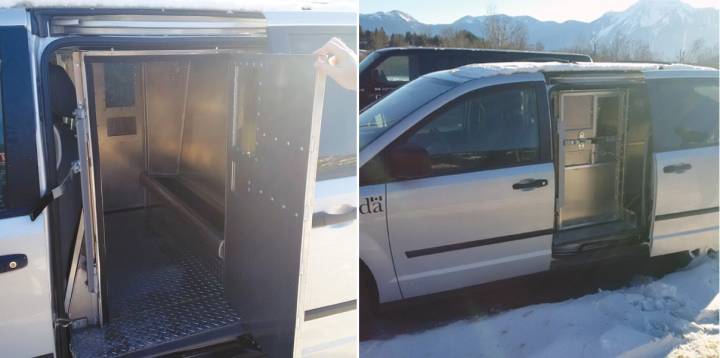A routine trip to the Kingston, Ont., appeal court turned into nearly eight gruelling hours shackled and cramped in a prisoner transport vehicle, an allegation made by 65-year-old Bath Institution inmate, Edwin Nott.

The alleged incident occurred on February 7, 2018, where Nott says he was waiting to stand in front of a judge to appeal his prior conviction; not only did he not get his time in court, he fell ill.
“They stuffed me into this transport van, shackling my wrists and ankles so I could not move.”
Nott continued on to say, “After a few hours, I began to panic because I’m ill and have a heart condition and I thought they forgot about me,” said Nott about his experience in the small prisoner transport vehicle.
Once the officers came to retrieve Nott from the van, he says he required medical attention because of chest pains that needed nitroglycerin spray. Nott also says he had reduced blood-sugar levels, was dehydrated, and suffered ruptured blood vessels on both wrists from the shackles.

Get daily National news
Due to this experience, Nott is suing the federal government for compensation.
“I’m looking for $1 million for pain and suffering,” said Nott.
In the interview with Global News’ Kraig Krause, Nott displayed how he was shackled, hunched over, and pressed against his walker in the transport van.
Although, the lawsuit is personal for Nott, he also wants corrections to change its practices. It’s a demand that is echoed by federal prison ombudsman Ivan Zinger, who says he has been following prisoner transport safety for many years.
“The aluminum and stainless-steel compartment where shackled prisoners sit en route to court or medical appointments “is totally devoid of any comfort or safety feature, including seatbelts,” Zinger wrote in his 2016-17 annual report.
After Zinger’s criticism of the “tin can” minivans in his annual report in 2017, the correctional service said it would replace the security escort vehicles to reflect industry advancements.
- As Carney heads to India, Canada seeks to revoke citizenship of 2008 Mumbai attack ‘mastermind’
- Porter becomes latest Canadian airline to restart service to Mexico
- Kendamil baby formula sold at Costco recalled due to toxin concerns
- What to know if you’re stuck or have an upcoming flight to Puerto Vallarta
Corrections would not speak about Nott’s lawsuit, citing the Privacy Act.
Nott is expected to be released from Bath Institution in August, and is hoping that his lawsuit will ensure that no other prisoner will endure the pain he did on that winter day in 2018.
“The correctional investigator called it a sardine can and it is a sardine can, you can’t move. That is just not right,” said Nott.
Corrections told Global News that it anticipates all small minivans serving as security escorts will be removed from duty by March 2019.









Comments
Comments closed.
Due to the sensitive and/or legal subject matter of some of the content on globalnews.ca, we reserve the ability to disable comments from time to time.
Please see our Commenting Policy for more.